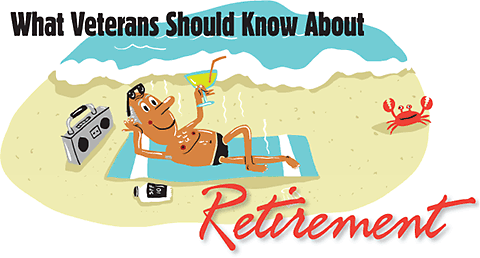 |
||||||||||||
|
September/October 2015
BY SCOTT BERMAN You’ve worked most of your life, and you’ve served your country. Whether you’re ready to retire or already enjoying a post-9-5 life, it’s essential to be sure that all your ducks are in a row and your future is secure. Overwhelmed by the seemingly endless resources and ideas on how to maximize your return on your savings, investments, and benefits? Not positive that you’ve taken the steps you should? Wondering what retirement will look like? What you can do to ensure a secure, financially stable retirement? Retirement comes with many questions. But by taking steps to ensure that your changing needs are covered, you can keep your finances sound and your retirement secure. By taking it one step at a time, the answers to these questions become apparent—replacing uncertainty with confidence about this next stage in your life.
If you are on any kind of disability or receiving military assistance, make sure it will continue after you leave the workforce. Your state may provide additional resources. So in addition to checking the VA eBenefits portal and working with a service officer and benefits counselor, go to your state’s Veterans Affairs offices to learn about additional state benefits and retirement options. Be sure to take advantage of veterans service organizations. Vietnam Veterans of America can help navigate the veterans benefits process. If you are unsure what benefits you qualify for or how to apply for them, go to a veterans service officer or VA benefits counselor. They will work with you to determine which veterans benefits you are entitled to. These volunteers are a great resource to help navigate the sometimes-complicated waters of applying for benefits. You can find service officers in your state through the VVA website and VA benefits counselors by contacting the VA facilities in your state. You can also check the VA eBenefits portal, which provides service personnel, veterans, and their families access to information and applications, as well as a benefits handbook.
Make sure that your health and life insurance coverages are up to date and appropriate considering your overall health and needs as you age and move into the next phase of life. Review Social Security and Medicare to make sure that you are maximizing these as soon as possible, or delay them if it makes financial sense. Resolve outstanding debts as soon as you can so that you can enter retirement debt-free. Your retirement will suffer if part of your retirement income goes to paying off debts.
Once you’ve determined your monthly income during retirement, you can develop a budget that supports your lifestyle and allows you to pursue your interests. Something important to remember is that as people live longer, retirement lasts longer, and your money may need to stretch further than you anticipated. Review your budget and resources at least once a year to keep on top of your finances.
In addition to financial and medical benefits, veterans benefits can include assistance in pursuing your interests. For example, if you want to start your own business, the Small Business Administration gives tax breaks to veteran small business owners. These and other benefits help you pursue your interests, and they let you avoid depleting your other resources. Life happens during retirement the same as it does during your working years. A serious illness, sudden injury, or accident can have a serious impact on your financial health. Keeping an emergency cash fund, developing plans to deal with unexpected expenses, and keeping your health and accident insurance up to date are important for your continued financial security and peace of mind.
Additionally, if you become unable to manage your benefits due to advanced age, the VA can appoint a fiduciary to manage your benefits and oversee that fiduciary to make sure that he or she meets your needs. Retirement is also the time to focus on protecting your legacy, ensuring your loved ones are cared for, and determining the quality and type of your end-of-life care. Setting up a financial structure that guides your care and inheritance distribution will ensure that you maintain control of your retirement no matter what happens. You want to leave your loved ones on a solid financial footing when you die. Steps you can take to accomplish this include creating a will and setting up survivor benefits through the military and Social Security. Work with an estate attorney to create a will and review it regularly. Check into what survivor benefits you and your loved ones will qualify for. These may include a survivor’s pension, death compensation, medical benefits, and a percentage of your Social Security income. And be sure to determine what steps you need to take to ensure that your loved ones will receive these benefits. For example, if you qualify for veteran survivor benefits, you may select a survivor benefits plan to guide delivery of the benefits your loved ones will receive. Beyond putting the documents in place, communicate your wishes to your family or other beneficiaries so they can act on your behalf if you are unable to do so. Although conversations about end-of-life matters are never pleasant, do not wait to put these plans in place. Full disclosure protects your loved ones in case of an unexpected accident or tragedy. Your military benefits do not end when you die. The VA provides burial and memorial benefits that ensure that you and your service are honored and some of the financial burden of burial is lifted from your survivors.
Arrange for medical financing. Age-related medical expenses can be a huge financial drain. While Medicare and up-to-date health insurance are important elements of your medical financing, find out if you qualify for additional medical benefits for veterans. If your health was negatively affected by your service, you may qualify for financial compensation or medical fee assistance. Beyond traditional medical benefits, you may qualify for long-term care options available to veterans through Federal Long Term Care Partners or Armed Forces Retirement Homes. Have your financial documents in hand when you look into long-term care or retirement homes, as eligibility may be based on need. As with all retirement planning, it’s best to find out now about available options so you will have them in place when you need them.
Beyond the resources available through VSOs, consider engaging a personal financial advisor. Financial advisors can help you develop a retirement plan that maximizes your available resources so that they last the length of your retirement. In addition, they work with you to invest your existing assets and excess income to bolster your financial position. Once you are retired and your plan is set in motion, financial advisors can help you adapt to any changes or setbacks, develop an emergency fund, and help you arrange your finances to meet your developing interests. Learn more about the specific pieces of your retirement plan. Social Security, military benefits, and maintaining financial control can be complicated, but they are an integral part of your financial planning: The more you know about them, the more solid your financial footing. With this knowledge in place, you will have the tools to create a detailed, thoughtful plan to guide your financial future. More information is available at the Veterans Benefit Administration: www.benefits.va.gov/benefits and the VA’s eBenefits Portal: http://explore.va.gov To locate a VVA service officer, go to https://benefitsforum.org/Rep.aspx
|
||||||||||||
|
|
||||||||||||
|
||||||||||||
8719 Colesville Road, Suite 100, Silver Spring. MD 20910 | www.vva.org | contact us |
||||||||||||



















 Retirement can be exciting, sparked by ideas of what you’ll do with your time and your new-found freedom. But putting your financial house in order is the key to realizing your dreams. You need to determine the state of your resources and craft a retirement plan and budget that allows you to pursue your interests.
Retirement can be exciting, sparked by ideas of what you’ll do with your time and your new-found freedom. But putting your financial house in order is the key to realizing your dreams. You need to determine the state of your resources and craft a retirement plan and budget that allows you to pursue your interests.
